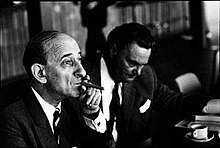Raymond Aron
| Raymond Aron | |
|---|---|

Raymond Aron (1966) by Erling Mandelmann
|
|
| Born |
14 March 1905 Paris, France |
| Died | 17 October 1983 (aged 78) Paris, France |
| Alma mater | École Normale Supérieure, University of Paris (Dr ès l) |
| Era | 20th-century philosophy |
| Region | Western Philosophy |
| School | French Liberalism |
|
Main interests
|
Political philosophy |
|
Notable ideas
|
Marxism as the opium of intellectuals |
|
Influences
|
|
Raymond Claude Ferdinand Aron (French: [ʁɛmɔ̃ aʁɔ̃]; 14 March 1905 – 17 October 1983) was a French philosopher, sociologist, journalist, and political scientist.
He is best known for his 1955 book The Opium of the Intellectuals, the title of which inverts Karl Marx's claim that religion was the opium of the people – Aron argues that in post-war France, Marxism was the opium of the intellectuals. In the book, Aron chastised French intellectuals for what he described as their harsh criticism of capitalism and democracy and their simultaneous defense of Marxist oppression, atrocities, and intolerance. Critic Roger Kimball suggests that Opium is "a seminal book of the twentieth century." Aron is also known for his lifelong friendship, sometimes fractious, with philosopher Jean-Paul Sartre.
He is also known for his 1973 book, The Imperial Republic: The United States and the World 1945-1973, which influenced Zbigniew Brzezinski and Henry Kissinger, among others.
Aron wrote extensively on a wide range of other topics. Citing the breadth and quality of Aron's writings, historian James R. Garland suggests, "Though he may be little known in America, Raymond Aron arguably stood as the preeminent example of French intellectualism for much of the twentieth century."
Born in Paris, the son of a secular Jewish lawyer, Aron studied at the École Normale Supérieure, where he met Jean-Paul Sartre, who became his friend and lifelong intellectual opponent. He was a rational humanist, and a leader among those who did not embrace existentialism. Aron took first place in the agrégation of philosophy in 1928, the year Sartre failed the same exam. In 1930, he received a doctorate in the philosophy of history from the École Normale Supérieure.
...
Wikipedia
